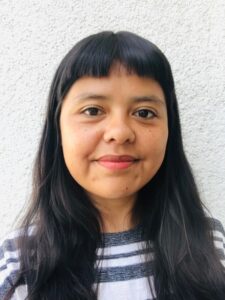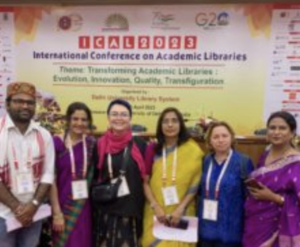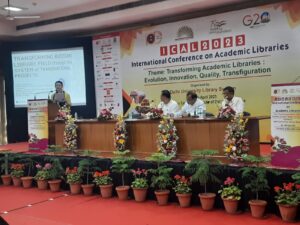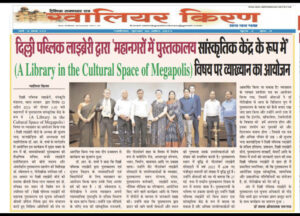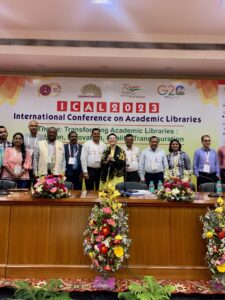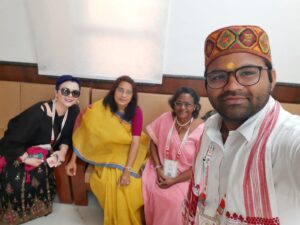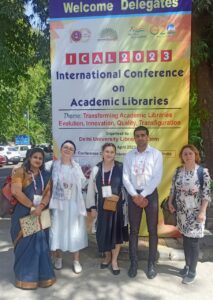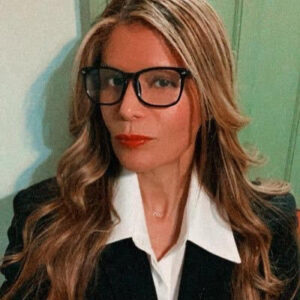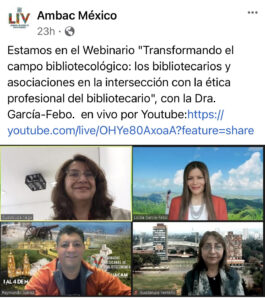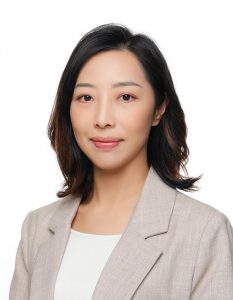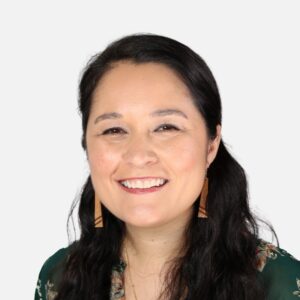Colleagues, we are excited to announce the our new episode (season 4) of the CPDWL Podcast Project where we feature library and information professionals who support and participate in professional development work.
See here for the podcast
Our co-hosts for this episode are Ray Pun (CPDWL) and Catharina Isberg (M&M). Our guests are Kate Dohe, Celia Emmelhainz, Erin Pappas, and Maura Seale. The topic is on sabotaging and saboteurs in libraries.
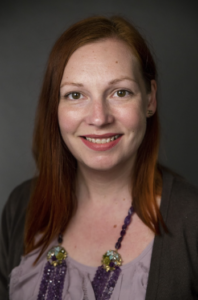
Kate Dohe (she/her) is the Director of Digital Programs & Initiatives at the University of Maryland Libraries. Kate’s team oversees day-to-day activities related to digital content creation, access, and preservation, as well as digital library application services, web services, and discovery platforms. Select publications include “Care, Code, and Digital Libraries: Embracing Critical Practice in Digital Library Communities” (In the Library with the Lead Pipe), and “After Fedora: Linked Data and Ethical Design in the Digital Library” (Ethics in Linked Data, forthcoming). She holds an MLISc from the University of Hawai’i at Mānoa, and a BSEd in Speech and Theater from Missouri State University.
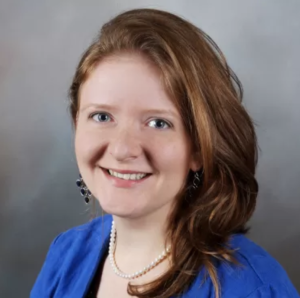
Celia Emmelhainz is a supervisory anthropologist and head of the National Anthropological Archives at the Smithsonian Institution. She previously worked as an academic librarian in California and Maine, and as a school and university librarian in Kazakhstan. She holds degrees in library science and anthropology. Her research projects have focused on personal names, missionaries, emotional labor, organizational dynamics, career decision-making, missionaries, and neurodiversity in libraries.
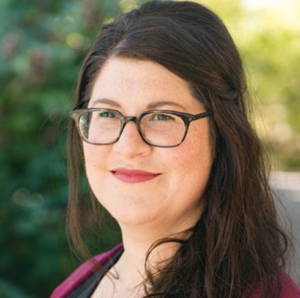
Erin Pappas is Research Librarian for the Humanities at the University of Virginia, where she supports Slavic Literatures and Languages, Anthropology, Linguistics, Media Studies, and Women, Gender, and Sexuality. She holds degrees in Russian literature and anthropology from Reed College, in anthropology from the University of Chicago, and in library science from the University of Kentucky. She is the co-editor, with Liz Rodrigues, of the #DLFTeach Library Cookbook. Her research interests include emotional labor, early career mentoring, international digital libraries and digital humanities, and improvisation.
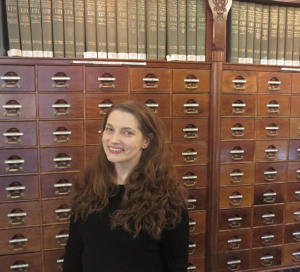
Maura Seale is the History Librarian at the University of Michigan, providing research and instructional support for students and faculty in the History Department. Her research focuses on critical librarianship, library pedagogy, political economy and labor in libraries, and race and gender in libraries. She is the co-editor, with Karen P. Nicholson, of The Politics of Theory in the Practice of Critical Librarianship (2018), and is also co-editing the forthcoming volume from ACRL Press,Exploring Equitable and Inclusive Pedagogies: Creating Space for All Learners. Her work can be found at www.mauraseale.org.
Reference:
Centivany, A. (2017). The dark history of HathiTrust. In Proceedings of the 50th Hawaii International Conference on System Sciences. https://ir.lib.uwo.ca/fimspub/120/
Dohe, K., Emmelhainz, C., Seale, M., & Pappas, E. (2022). The saboteur in the academic library. In Libraries as Dysfunctional Organizations and Workplaces (pp. 149-166). eds by Spencer Acadia. Routledge.
Ettarh, F. (2018). Vocational awe and librarianship: The lies we tell ourselves. the Library with the Lead Pipe, 10. https://www.inthelibrarywiththeleadpipe.org/2018/vocational-awe/
Petersen, A. H. “The Librarians Are Not Okay.” Substack newsletter. Culture Study, May 1, 2022. Accessed March 9, 2023. https://annehelen.substack.com/p/the-librarians-are-not-okay.
Holyoke, F & Acadia, S. (2022). CPDWL Project Podcast Season 3, Episode 5. https://blogs.ifla.org/cpdwl/2022/11/04/cpdwl-podcast-project-season-3-episode-5-spencer-acadia-and-fran-holyoke/
Transcript:
Ray: Welcome to the IFLA CPDWL podcast project. In this space we talk with library and information professionals who support and participate in professional development work. My name is Ray Pun, a CPDWL standing committee member and co host. I’m here with Catharina Isberg, a co host and CPDWL advisor and IFLA Management and Marketing standing committee member. CPDWL and M&M sections are collaborating on discussing challenges and issues and leadership and overall toxic librarianship. Catharina, welcome.
Catharina: Thank you very much Ray. My name is Catharina and that is like I’m from Sweden. And not native English speaking in this context. As Ray said, part of the Management and Marketing section and we actually just celebrated our 25th anniversary. So it’s a section that has been around for a couple of years working on management and marketing issues. And for example, we have the IFLA pressreader International library marketing award every year and also we have a blog where we collect different things about management skills and we collaborate with CPWDL as Ray said.
Ray: Great, thank you for sharing. And so we are co-hosting this episode today, and today we have four guests with us. Kate, Celia, Maura and Erin are co-authors of this chapter called, “The saboteur in the academic library,” published in Libraries as Dysfunctional Organizations and Workplaces edited by Spencer Acadia. Welcome all. How about you all introduce yourselves. Let’s start with Kate.
Kate: Great so I’m Kate Dohe. I’m the director of digital programs initiatives for the University of Maryland Libraries. Thank you for inviting me today.
Ray: Celia?
Celia: I’m Celia Emmelhainez. I am the program manager for the National anthropological archives in the Smithsonian and formerly an academic and school librarian.
Ray: How about Maura?
Maura: I am Maura Seal. I’m the librarian for History at the University of Michigan.
Ray: And finally, Erin.
Erin: Yeah, probably the shortest title Erin Pappas. I’m humanities librarian at the University of Virginia.
Ray: Thank you all so much. We’re excited to have you all here and looking forward to hearing your thoughts. So Catharina and I have questions from a few M&M and CPDWL standing committee members, we had a chance to review your chapters in advance. So for those who haven’t read this chapter yet, I’ll briefly share that this article is focusing on the acts of sabotage in academic libraries, and how to address and understand the unintentional and willful saboteurs alike as the co authors wrote in the abstract, “library saboteurs have the potential to derail and impede our organizational missions, as well as to push back against toxic leadership and mismanagement. This chapter explores the power and powerlessness of the library saboteur and outlines how staff at all levels can identify the saboteur in the next cubicle and in their own learned behavior.” So let’s start off with this first question. Why this topic? How did you all connect with each other to work on this article? How about we start with Erin?
Erin: Sure. So this is definitely an instance where you don’t want to give too much away but anybody who does a tiny little bit of digging will definitely be able to, to identify. So three of us used to work together at one institution or one of us to did not but we’re connected through various particularly areas studies and kind of subjects the specialities and we connected because we work together and we worked in a sort of dysfunctional workplace. We’ll put it that way. And so the topic was very much worn out of experience. The topic was very much born out of like kind of the beginning to be joking and being like, Hey, has anyone seen this and has anyone seen this, you know, sabotage manual and blah, blah, blah, and starting to think about it in a kind of more systematic way, especially once we got all dispersed and relocated from that particular work environment. So this was something that we all kind of felt resonated with us in former positions, certainly in our current workplaces, capacities, and a conversation that we’ve all had ongoing as collaborators as friends and as colleagues, I think over the last few years, so we kind of hate and Celia and I sort of began this in a very low key way with a presentation and then more kind of joined in and it became a little bit more of a serious, ongoing project. I think that covers it. Does that feel about right? Okay.
Catharina: Okay, thank you. When I was reading an article, I was actually starting to wonder about being a saboteur is one thing, but having a sabotaging behavior. is another thing, because it’s a full scale from just a minor behavior until you get up to almost being a saboteur. So what would you say is the difference between the saboteur and the person sabotaging behavior? Maura, would you like? To start over?
Maura: Sure, I’ll get us started. So I think Ray alluded to this too, in his introduction. But I think an important thing in our chapters is that anyone can engage in sabotaging behavior and we all probably do at various points. There are things we don’t want to do. There are things that you know, some of sabotage we talk about being related to like having too much work, not having enough autonomy, things like that. So I think a key takeaway is like we can all do this. There’s not like the deviant saboteur, like as a standalone figure like we all engage in this behavior. And the important thing really is to recognize when you are doing it and for in, you know, for which reasons why are you doing this, and you know, I say a lot like don’t lie to yourself. So acknowledging, like, if you’re, you know, stymieing a process or or what have you. And I do also think that there are saboteurs I can think of people who are just sort of interested in mostly shutting things down and not letting like, good things happen in avoiding things that make them uncomfortable, and those sorts of things. So, I feel like we, I at least tend to see more of like people engaging in sabotaging behavior, and then occasionally, you’ll see like, a very bad actor who sort of goes beyond that and, and I don’t know what their deal is, but yeah, and I don’t know if anyone else wants to jump in here. That’s sort of how I took that question.
Celia: I think, this is Celia, I think I would add that saboteur often when we use the word in English, we think of it as being very deliberate. So somebody’s deliberately continually doing something and a sabotaging behavior as more outlined. All of us do that, in many ways, in our friendships, in our households, in our workplaces. It’s a human behavior. That’s a learned behavior. And so you know, whether that’s good or bad, I think that’s something we could continue to discuss.
Kate: I’ll chime in just a little bit more. This is Kate. You what there are two things that I was very interested in when it came to this idea of like sabotaging behavior versus like be just being a saboteur. You know, as Aaron mentioned, you know, we all started or like many of us, you were at one institution and all moved on to like different organizations and you know, have seen this kind of again and again is commonality in like a lot of workplaces. I went to a management position. I’m currently in the middle manager level role right now. And I started to think more about the ways that sabotage gets very explicitly used particularly by people who are moving up the managerial chain. And so that, again, is something that I would often think about when it came to you as a manager and thinking even myself and reflectively, they’re like, Okay, is my reaction to this and my strategy here weaponizing, the organization right, and if I am doing that, and if I’m making those choices I you consciously try and stop myself about that, or at least as you Maura says, like, not lying to myself, to the best of my ability. But yes, you know, back to the point about like, people who are just saboteurs this is the way that they operate in the world. I also was thinking a lot about like library change management and particularly about how that is frequently a reaction organizational change and fundamental powerlessness. But, and I have seen that again, and again across like a variety of different workplaces and themes, but yes, I can also think of people who, you know, frequently are, I think malicious actors in the organization and that they’re difficult to deal with because they have figured out how to play by our structures in the organization across you know, and against each other. So
Catharina: Excellent. Thanks so much. It’s really a responsibility that we all have in the organization to really look into and reflect on what we’re doing.
Ray: Yeah, I should say that it reminds me of maybe some activities that’s inherently political. I mean, everything is political, but but search committee interviewing process, I feel like that has gravitated towards more of people wanting to sabotage because they prefer one candidate or the other or for whatever reason, and I feel like there’s some something to be said about certain types of activities. And it reminds me also of these metaphors, I keep hearing over and over which I don’t, I don’t recall being mentioned in the article or chapter specifically, but I think it’s worth mentioning it here in the podcast, so I’ll just say them briefly. For instance, there’s an article I read maybe it was the Harvard Business Review where they describe people as possibly as conflict entrepreneurs, people who are seeking out conflict for you know, sometimes for their own benefit or for some self interest or for the organizational good, right. But because conflict, sometimes can can create creative tension, which is sometimes needed, but sometimes it can create as we all experience in different ways, challenges. So there’s, there’s those types of folks. And then there are broken records, people who will keep saying over and over things have been done this way. And we won’t change or what for whatever reason, right? So so it’s stymie the process as well, right? And so so that’s something that I heard, and the next one is traffic cone. People who will block the flow of work and you got to work around them. I know it’s kind of odd to hear that but sometimes there are people who just refuse to work with the way things are going and you have to move the traffic cone to other other areas. So anyway, I’m just sort of like reflecting on what you all share and then some of the sort of parts and pieces that I’m hearing that people are sort of naming them in different ways. And so our next question is about the word sabotage which while we were also describing it as having negative connotations, however, as argued in the chapter, it can be used for good too. So for example, advocating for social justice, equity, fighting against mission creep, attending to self care, and then the bad parts right? Like power plays, workplace bullying, microaggressions, etc. So do you think that sabotage is the most apt term when used as a shield? Maybe those actions are better described as resistance or something else or more fight for the right than saboteur and I wonder if anyone wants to jump in?
Celia: Yeah, this is Celia. I’ll jump in on that. I think one of the things that we talked about in our chapter referring to your sort of fight to the right is that people often cloak or think of their own actions as right or just and sometimes they are and sometimes they are. And so if we shy away from using a term like sabotage because it feels loaded, one of the challenges we have is that even people who are doing pretty pernicious sabotage will frame everything they do as right and just so that’s the first thing that occurs to me there. Second, I don’t think we should be afraid of bad human behaviors and this is my take on anthropologist negative social behaviors are part of how social humans like social animals function. And I think one thing I’ve reflected on recently, I’ve also recently moved into a management position and I’m now at a different place in an organization and the complex I face are different. The challenges I face are different. And so if I do sabotage, it’s taken maybe a different shape in my toolkit and something we didn’t look at that I would be very curious about would be is sabotage different at different levels of an organization or a power structure. Does it work differently? Does the behavior itself look different?
Erin: Oh, no, I was just gonna say that point to power is really, really interesting. And actually, I’m like, oh, that’s something I’d like to you know, kind of explore further because one of the things we’ve spoken about before is that kind of situational sabotage which Ray I love that idea of the traffic cone like I’m already thinking of like, very simple workflows where you’re like, alright, well, we know so and so is going to put up this roadblock or we know so and so is going to be unhappy about that. And you actually have to spend a lot of time and energy kind of, you know, diverting the flow of traffic around them, but I don’t know I don’t know if it’s a great idea than to be like, oh, when we purposely do this kind of action, it then has a positive outcome. I mean, this this manual is literally about, you know, resistance fighters, right. So I think it can be a little bit weird to then be like, we’re somehow you know, resisting things being done to us. I think it’s still I think it’s okay to still call it sabotage that that kind of semantic weight can maybe go either way, but yeah, I think talking about the question of power is maybe like a little bit more interesting because the sort of net outcome may be the same but like, where the power rests and whether it’s a sort of like yes, I love that conflict entrepreneur. I expect to see that on someone’s like Twitter bio in a moment, but like whether or not right the person is doing it as something sort of reactive and or situational and like den doing that from a place of having less power, I think is perhaps different from someone who like like Kate and Celia at some kind of slightly higher up perspective has have noticed, so that might be worth kind of considering but yeah, resistance is okay, but I don’t think I would say I’d want to like add any other kind of loaded terminology just because I think it like some people who are some of the worst saboteurs actually think they’re being super helpful, or that they’re actually making things better and everyone else is like, why are you like this like this? Is absolutely un-tenable.
Kate: Right? This Kate. Yeah, like to everybody’s point here. I do think and certainly from people that I know that have engaged in sabotage behaviors or who are actively saboteur is like they do tend to believe I think, first and foremost that they’re, you know, helping other people and I think frequently that that is not always quite as clear cut. And again, I’m thinking about this a bit from a managerial position. It’s like a question to me of like, communication. Okay, so like, a good hypothetical example. I’m trying to be a little sensitive about like a just not like being like, Oh, this other fun story from work the other day for one, but I’m also trying to generalize some actual stories that I have heard but like a good example might be like, computer labs. Okay. I think that many of us that work in academic libraries, in particular, you’re used to seeing or computer labs during finals exams, like they are chockablock, you know, certainly in my library with student workers, or sorry with students, they’re working on their projects and they have like that urgent need and I think that in a hypothetical scenario where like management and leadership have decided that we actually are going to need that computer lab space, we’re gonna have to clear out like 70 of those because you know, a it’s not cost effective for us to necessarily maintain all of those when increasing amount of students are really working off of their own devices. And then B that space might be better utilized for serving different future user needs, right. Like digital scholarship, or like, you know, information labs or different types of research space. I’ve seen and certainly like I think we can all think about like some ways that saboteurs would find that resisting consider themselves to be like, Yes, I’m advocating for the students. For those like you … like that crushing final exam season we cannot possibly get rid of all of these workstations, you know, and I’m doing it for them. And it’s like, Well, are you or are you projecting a lot of things here? You know, and again, I think that sometimes it’s something that’s common in libraries, is this tendency to kind of project like, Yes, I’m here for the user. I am a champion of the user, but really, I’m triangulating a lot. Of my own perspectives about how we work and what our office you know, what our organization does and who it serves. And then again, sometimes it’s you know, maybe there’s less buy in for this idea of like, something new and innovative either because it maybe hasn’t been communicated effectively by leadership or maybe it’s just still very hypothetical and untested, you know, those things happen as well. But that’s one of those like scenarios where I often think about this question of like, view, am I doing this for like, on behalf of somebody you know, considering this like part of the resistance or am I doing this because, you know, I have a lot of biases that have come to play in my approach.
Erin: Okay, that’s Oh, I like I actually like, I immediately was like, Well, of course, you want the computer. Like I can’t think of how many meetings I’ve been where I’m like, No, you can’t get there. You cannot assume that everybody has their own their own device or whatever. But I think there’s like there’s a real tension between that like, we’ve always done things this way. And that can be like, This is what the building looks like. This is what the workflow is. This is you know, how many people we have staffing the desk, whatever that is, but the like, less sexy work of maintenance, which we’re always constantly talking about. We’re like, okay, but who is staffing the desk, okay, but like, who is updating that computer lab and who is maintaining that and like sometimes, like just fighting for something like that baseline of maintenance ends up like being this kind of weird act of active resistance, you know, like I shouldn’t be taking a stand for like, don’t change the catalog in the middle of the semester or whatever it is that you’re trying to sort of do or like, maybe don’t do this update until, you know the summer what have you. So I don’t know. It’s like, it’s a weird tension, I guess because like, there are things if you said to me, we’re gonna get rid of the computer lab and replace it with a makerspace. I would immediately get there like, I can feel myself getting to review other signals, hypothetical scenario, and advocating for the students but then also, like, I see people who do that and like, well, nobody uses that or nobody is doing that. So it’s like, again, some of it’s just positionality, Maura, I think maybe you have something to say to it.
Maura : Yeah, I do. But but it’s not related.
Erin: So OK we should have zig zag.
Maura” I guess like one thing I just wanted to fly here is like libraries like within libraries, like we’re so averse to talking and thinking in productive ways about power and conflict. And that’s part of like being in higher ed like I don’t know how many like teaching faculty don’t understand that, like the university is a hierarchical system right and that some people have more power than others like they seem very often seem very resistant to that. And I think it’s just sort of exacerbated by sort of the culture of library niceness. But like that real aversion to thinking about and it’s not like power is always bad either, right? Like you can deploy power in like productive and like good ways, but like we really don’t want to talk her think about it. Like everyone gets along here. Everyone’s fine. And also just I think goes with that, like, I’ve been thinking a lot about how so many things are wrapped up in feelings like how people have feelings about things that like and no one acknowledges that was either so
Celia: I think this is Celia. One of the other things several things come to mind to me here. And one is I’ve had some times recently where I felt like I had to insert myself to pause something that wasn’t working effectively and I was pretty direct. I’d go to somebody and say, I don’t support you. I am going to be trying to block this and here’s why. And I felt a certain amount of competence in doing that. And to me that’s a little bit different than sabotage because I’m not being deceitful about it. But at the same time I recognize like Maura says we’re often in organizations where motives are cloaked and where we’re not honest. And that’s part of how the organization operates. And you can’t always be honest. So we talked about that a little bit in the chapter about what about if you can’t make an open assertion of what you or your users need? Does that sort of inevitably lead to sabotage? And this conversation had me thinking about a chapter a friend handed me not too long ago. In a book called images of organization. That’s 1980s organizational theory type books. So it’s a little outdated, but it was very interesting. There was a chapter called interests, conflict and power organizations as political systems. And it was kind of outlining the situation we sometimes find ourselves in but also cautioning that this is a metaphor and that we don’t want to sort of start to see political power plays and sabotage, in every action that we or our colleagues make. There really are other ways to see this and reframe this to
Catharina: Excellent. It’s really interesting to listen to you and we have been talking about these different levels. But I really think that in the end of this discussion right now, we started thinking about the levels of power maybe isn’t that important. But then also, we can start to think about different kinds of libraries. Is there a difference between a public library or an academic libraries you have in the chapter looked into the academic library mainly, but can you see the difference between different library types? And also, as you said, we really feel strongly about libraries. Is that something that really makes a difference to other businesses when it comes to centers?
Kate: So how can you get started on this? I think that you know, everybody’s alluded to this at different points, I think in the course of this conversation, but one of the things in particular, I think what we found interesting about approaching this from the academic library setting is that they are frequently like deeply hierarchical organizations that masquerade as egalitarian ones. Right. And you in particular, what I think about when it comes to like the academic libraries is the way that we are also frequently like subject and situated to the institutional hierarchy, right. And this one, I will actually draw on some of my experience at the University of Maryland because I actually give like a lecture about this and I talk a lot about like organizational power. So I’ll just run with this. Um, you within our academic library, you know, I am also in addition to being like in supervisory position, I am a tenured faculty status librarian or technically we have permanent status. Because we are not allowed to have full tenure in the same way that the instructional faculty are, which is another set of power and hierarchy in my organization. But I am afforded a lot of you privileges within that organization and a lot of power within that organization that is not available to other permanent status track faculty who are still on the path and need to get voted on by their peers. Certainly in comparison to staff members in my organization, who have fewer opportunities available to them and who have like, in many cases, somewhat limited ability to participate in certain types of projects and certain types of shared governance, and to be able to supervise certain types of personnel, right. We have encoded all of those things within our organization. And yeah. And to typically say, like, well, we’re the libraries and try and allied a lot of those like power differentials. And I think that’s where we really saw the differentiation with academic libraries. A secondary piece of that is our relationship to the institution, our parent institution at large, where as a Service Unit, we and I think that different organizations feel this in different ways. But I’ve worked at relatively few universities where the libraries were very much for grounded in terms of you the narrative on campus, right frequently we we’ve always been, I think, a bit of an afterthought, a little bit of like, oh, the libraries will do that type of position. And so there’s, I think, sometimes a tendency towards in libraries to feel that as a different type of status, right that we aren’t necessarily equivalent with other research units on the campus that we are expected. To be in a service role for faculty. And I’ve seen different organizations that tend to take, you know, and different leadership styles where we’re very much at the whims of faculty on campus or other department heads or donors who may come in with a new and exciting project. And suddenly, that’s something we’re doing and not necessarily like steering our own course. When it comes to other types of businesses, I’m gonna sidestep a little bit on like other types of libraries and public libraries because I suspect Celia might have some perspective on this now. But when it comes to other types of businesses, I’m very interested in some of the literature on sabotage that happens in other types of service professions and organizations right, and that that tends to be a little bit more around like sabotaging the customer service exchange, right? Like, if you need to be if one example that I found that I was really interested in was hospitals and health care because I think they also suffer from a lot of the same broader issues around like, you know, vocational law and you know, pink collar gendered professions. And so I felt that was like a nice comparison. But there are a lot of people who are in health care who can very much sabotage your experience of that entire process and you there have been a lot of like literature and studies about how that is directed frequently like at people who are in need or who are trying to navigate that system from the outside. That I found interesting, because I don’t know that there’s a lot of that necessarily in libraries. So the thing that I was really struck by was in what the articles that we cite, and the has kind of been part of this process is just pulled it up. So I have the citation. correct for this. Alyssa sent of Annie’s article, the dark history of hobby trusts, and it’s about the formation of the hottie trust initiative, the several years ago. Half of this article is very much around the you know, system design and the technical specifications and the needs for managing large amounts of digital data. And then the back half of this article is all of the political conversations that went on across mostly the big 10 consortium to get this project off the ground. And so they did. Like one of the quotes in there that I always go back to is, from one commenter in the article was that the library professional is really Catty, and tense and neck horizontal violence on each other. And I think that we can unpack a lot of like the gender implications of the phrase caddy, but I do think this concept of horizontal violence very much like rings true. I’ve very rarely seen in library organizations, sabotage and sabotaging behaviors directed patrons, but I very frequently do see it directed internally.
Erin: Before we maybe talk this exam, by the way before we talk about public and other kinds of institutions, I just want to add one thing. From my perspective, I haven’t worked in a public library since I was a teenager so I definitely can’t speak to that. But I have done some work in industry and like the research side of things is actually like time I know that maybe sounds a little bit weird but like the the tempo like the speed at which things happen. So like in academia in particular, like every train wreck is very slow moving and like if I have a friend who works in business, and they like, I’m interviewing for a job and then like a week later they have the job like, like, what what are you talking about? How does that work? How does that even happen? So I definitely sometimes think oh, sorry, I that’s a UVA alert for some sort of crisis that’s happening. But I definitely think about like the speed at which things happen, right and like things happen in industry a lot more quickly. Things happen in academia. Very slowly, like at a glacial pace, and I would say, within the library, potentially even more slowly than that. So it’s like it’s a lot easier to see these things be articulated when the sort of perceptual partisan takes so freakin long. Right? So like, I think that’s just the like, kind of like an aside, but I wanted to make sure it was introduced for the one one solution would be to quicken the work tempo. I mean, that would be I think, that would take a real overhaul in, in values and also like the idea of like, like Kate was saying, like being an egalitarian, being deliberative, like I think that would be really, really hard to do. And what’s more is that the people who have worked in kind of very hierarchical top down institutions like that often seems to be the ways things get done. But then that leads to another form of dissatisfaction where it’s like, well, things got done, but nobody was happy with it. Right.
Catharina: And Celia, you, did you want to add anything on this?
Celia: Sure. So I worked at a school library in Kazakhstan for two years with some international experience at University Libraries abroad and then now I’m working in a museum that’s part of a government and I’m working in an archive. So it’s some tangentially related areas. And if I look across all of these experiences, I think in each one there was a process of learning not just with a formal organization chart was but who actually held the power and it’s very different within a given type of libraries, but also across libraries or organizations. And learning, who tended to have the power to push things ahead or slow things down as Aaron spoke to tempo. And that would vary who had the power of input so in public libraries, your board or your community may have a lot more power than in a school library or in a university library. And so I think if you’re trying to move ahead, good things and speak truth to power when you see negative things come along, being able to read those dynamics and then decide what your own ethics are and kind of work humanely there is, is pretty important. I don’t know that I have super specific advice except to just talk around meet peers and learn how organization organizational dynamics work in your type of library.
Ray: Yeah, I certainly think that there is a saying, particularly, maybe it’s more in North America, but a saying where in academia, everything is a big deal, because the stakes are so small. And it’s sort of like this tension where you know, there’s a lot of power plays and you know, sort of discussions being had a visibly or invisibly. And I think that also true to certain extent for to all types of libraries sort of like experiencing that because, you know, we all have a certain interest in promoting the work and activities, but it’s also like, there’s some conflict internally or the values are not as aligned so yeah, there’s a whole bunch of really interesting points that all of you are raising here. So I thought I wanted to share that before we move on to our next readers question, which is the Dohee or Dohe role mission framework. Give some good good tips right for addressing sabotage on an individual level. However, it is said that a toxic dysfunctional environment cannot be changed by a single person. So how can organizations plagued by sabotage work collectively to overcome and change organizational culture, especially for minoritized staff or staff from underrepresented groups?
Erin: It’s your name Kate. I don’t know if you need to speak to it. But I will say that anecdotally the fact that those of us who are all at the organization in question a vote departed may be a kind of indication, but there’s, like even a small critical mass of people can really do a whole heck of a lot, particularly when you’re without the institutional power. But, Kate, we gave it we gave it your name, or you gave it your name.
Kate: Oh, yeah, I know exactly how that happened, which was I was being cute. You know, it’s so like, I’m in the Washington DC metro region and like you can’t you throw a stone in a direction without hitting somebody that has like top secret clearance out here. Right. So I’m being like, cutesy about our headers right and using legs signals intelligence or like operations and like this is your mission, you know, playing off this like kind of espionage idea. And then our book editor came back and said, I really liked this role mission framework, and it’s like, great, I guess we’re committed now. So it is Dohe. I went from having a mu before I got married a name that nobody could spell that everybody can pronounce to having a name that everybody could spell, but no one could pronounce so it’s fine. We, as far as Yeah, like one thing that I think all of us were very careful about in putting together the book chapter and in talking about like, what are these action tips is not making it come across as like, alright, here you go. This is your responsibility to fix sudo because there’s a lot of like, I think really problematic advice that tends to be pushed towards like personal responsibility type. rhetoric, and we really want to steer very far away from that. Yeah, to Aaron’s point, you we, those of us that did work at the same institution have moved on to like other roles, and I think that, you know, it is extremely common, and I’m thinking now in terms of like, wherever we’re calling like this great resignation moment. I do think that many people got to the point of just departing from jobs that were no longer serving them or that had been toxic for a long time. You I also keep thinking quite a bit about Anne Helen Peterson’s keynote to the CALM library Conference, which we don’t cite in our chapter necessarily, and I could provide that link if people are interested in that For show notes or what have you. If you have not read that, but like I remember being quite struck by your job has gotten harder and it’s okay. To acknowledge that it has gotten harder in the last few years. And here are some of the reasons why I found that to be really quite empathetic. And really understanding of like, this is a system that you’re caught up in that does not necessarily like making it your responsibility to have to figure out how to like deal with your own feelings of burnout or frustration or what have you. When it comes to organizations that are plagued by sabotage, you know, one of the big things that I do think about often and the advice that I tend to give particularly if I lecture over at our universities, I school with up and coming aspirational librarians is to be very intentional about the interview process because I do firmly believe that like the best way that you as an individual can avoid being in a sabotage organization is to ask very savvy interview questions right and to not join those organizations. And I know that that is real scary when you may not have anything lined up and feel like you have to take a job and you’ve got the loans and you’ve got the pressure and you’ve got the like people around you who are going on to various what seemed like very exciting careers. But if you are interviewing somewhere, and it seems bad, if the vibe check is poor, don’t feel like you have to take that or that you have to subject yourself to that sort of culture. It is so much harder once you’re inside an organization to be able to like affect or survive any sort of like sabotage experience, and it is, I think, corrosive to the soul sometimes to stay in it. When it comes to like the organization’s trying to fix themselves I’ll defer to some of my other colleagues who have like I think maybe more knowledge around like collective organizing right and mutual aid networks, but those would be the two things that come to mind for me as just ways to navigate it. But I don’t think that change is always like that aspiration. I think it’s sometimes just protection.
Erin: I will say again, just total sidebar here but I have withdrawn from job searches as a candidate from my car, because the vibe check was off like I’ve like done like a one or two or three day interview. And then just been like, you know, this is not for me and like, you know, I have a job. I’m really lucky that I’ve been able to do that historically in the past but like genuinely if like you can’t be somewhere for six hours with fit like causing your skin to crawl. You don’t have to take that job like Go Go Temp somewhere and like polish your resume or like do a volunteer project because like once you were in that organization like organizational culture affects individuals like we get sort of sick from extremity by it. Right and like you have to kind of unlearn a lot of really nasty behavior and also I think the way it sort of changes you like the way you have to work like if you’re constantly going into work in like a sort of defensive mode or you’re going into work and kind of like expecting antagonism. Like you’re not going to do good work and you’re probably not gonna get a lot out of it other than like, yeah, I lasted you know, six months longer than the previous person at this position like you know, and you can definitely see too if you’re reading job ads and some places keep keep coming up like that might also be indicative.
Kate: You one thing that I’ll just chime in towards that, you know, like it’s trauma right when you leave a toxic and difficult work place, right, I remember for quite some time leaving a toxic workplace where there were certain tasks that were just not allowed at that organization and I would do them in my in new position. And I would have a lot of that like you adrenaline response, right? Like actual fear and then I’m like, no, no, this is an email. It does not merit like this level of toxicity, but it was like the amount of time that it took me to like unpack and process and I think the several of us have had the experiences of needing to like, unpack and process it the you know, again, just really trauma I think of working in very challenging workplaces has been something that you kind of need to consider as a part of that too is it can cost you even after you’ve departed that position.
Celia: One other thing I would acknowledge here is that the four of us who wrote this and we were very aware of this and how we were crafting this come from a majority ethnic group in our country. We have a lot of education, a lot of autonomy, great professional jobs. And so we’ve had a fair amount of power to speak up and speak back. And we’re certainly aware that many of our colleagues within libraries broadly, don’t always have that same amount of leverage that we have. And I would point to work that my colleagues have done, especially my colleagues, Natalia Estrada, and Bonita Dyess, who are librarians who started out as library staff and while they were staff were writing about the impacts. There’s an article called viewed as equal to the impacts of library organizational cultures and management on library staff morale, and when that project was developed, it was really essential to have staff at the table, not just librarians writing about staff. And so I think, you know, when we’re thinking as managers are we thinking as librarians about how we can improve our organization without asking staff to do more unpaid labor, making sure that they’re actually able to help make decisions and craft strategy for the organization can be very important.
Ray: Great, thank you, Celia, and maybe Maura if you have any last thoughts you want to add.
Maura: Sorry, I can’t unmute here. Um, I mean, I don’t have a ton like, I really take like Kate’s point about trauma after leaving a very toxic environment. I personally have always found it helpful to read Ask a Manager, which is a internet advice column that’s not about libraries, but it’s about other workplaces. But it does give you a sense of like, what’s normal at other places, and what’s deeply, deeply wrong at other places. And, I mean, I would just, you know, I don’t think there’s anything wrong either with if you’re in a situation and you can’t get out if you’re in a situation you have to stay in a toxic job, due to you know, commitment, other family commitments, or, you know, those sorts of things. Just checking out the doing the quiet quitting do only doing what you have to do. And and, like this is very difficult for me to say and I work on it in therapy, but like, just doing the basics of your job and not going above and beyond. And just sort of saying that that’s okay. And I will say to like, my workplace unionized during the pandemic, we have faculty status, but we’re not like tenure line faculty, like as, as all librarians with faculty status and seems right. But I hadn’t been here for super long when that effort started. And but I know that it was done because folks were unhappy with the way things were faculty status wasn’t providing certain sorts of protection and benefits. And there are some like staff unionization efforts also ongoing and no one does that right. Because they’re like, this is a great workplace necessarily. So my experience here has been more or less fine i But I also came from an extremely toxic environment. So it’s sometimes a little bit hard to sort of figure out like, what actually is going on? Yeah, that was a lot of blather. And I’m sorry,
Erin: It’s not a bother at all. And I will actually, like, maybe contrary to everyone’s advice, I don’t know it was like to actually advocate for self care and like, generally speaking, particularly if the toxicity is localized in like an individual or something like that, like that’s like if that person Bobby Chu, like go to yoga class when you know they’re gonna be doing something or like take your work elsewhere or like a you know, declined being on a committee with them or whatever, and like, do do things that like, you know, will sort of temper that because like, those people who are outliers can be like, really, really triggering and then it gives you a much like, more stable place I think maybe to like then deal with this. The smaller minor inconveniences of work. Life, but yeah, like more or less a reading asking manager where you’re just like, Oh, okay. I mean, it’s not like, it’s not always great. Sometimes just like, wow, that’s really messed up. But basically, you know, when she’ll be like, well, this is not normal. You’re like, okay, great, like I’m not gaslighting myself anymore about like, what, you know, I should just be able to endure this situation because this is clearly like I said, an untenable situation, but yeah, quite quitting. Do your job. Maybe if you can divest a little bit from it in terms of identity. I think that’s can be really good and do stuff if someone someone gets on your nerves really badly.
Ray: Yeah, thanks so much for those advice. Erin, Maura, Celia, and Kate really appreciate you all just making time and sharing your insights and diving into some of our questions from readers. And I just want to hold space and also asked if Catharine if you have any final thoughts
Catharina: I really have enjoyed listen to to you. And it is such an important topic and toxic workplaces. is really, really difficult to handle as an individual, but also as a group. And it’s a lot within the structure and it is a lot within the culture. And we can all make a difference but we really have to do it together. And don’t blame yourself. It’s usually within the structure. Thank you very much.
Ray: Thank you, Catharina. And thank you so much to all of our listeners. Be sure to check out the previous podcasts conversations with Spencer and Fran talking about similar issues that we were just raising here. And with that, enjoy the rest of your day.
 In this blog post, we interview Gabriela (Gabi) Mejias from DataCite! Gabi has been working in the field of research infrastructure for the past six years. She’s DataCite Community and Program Manager. In her role she leads DataCite participation in the FAIR-IMPACT project. She also leads the Global Access Program, DataCite’s new initiative to increase equitable access to PID infrastructure. Previously, she worked at ORCID focusing on community engagement, driving membership and adoption across the Europe, Middle East and Africa region and within ORCID consortia. Gabi volunteers across many initiatives to promote openness and inclusion in scholarly communications. She serves in the Board of Networked Digital Library of Thesis and Dissertations (NDLTD) and in the NISO Diversity, Equity, Inclusion, and Accessibility committee. This year she’s also been part of the csv,conf,v7 organizing team. She has a degree in Communication Sciences from the University of Buenos Aires (Argentina).
In this blog post, we interview Gabriela (Gabi) Mejias from DataCite! Gabi has been working in the field of research infrastructure for the past six years. She’s DataCite Community and Program Manager. In her role she leads DataCite participation in the FAIR-IMPACT project. She also leads the Global Access Program, DataCite’s new initiative to increase equitable access to PID infrastructure. Previously, she worked at ORCID focusing on community engagement, driving membership and adoption across the Europe, Middle East and Africa region and within ORCID consortia. Gabi volunteers across many initiatives to promote openness and inclusion in scholarly communications. She serves in the Board of Networked Digital Library of Thesis and Dissertations (NDLTD) and in the NISO Diversity, Equity, Inclusion, and Accessibility committee. This year she’s also been part of the csv,conf,v7 organizing team. She has a degree in Communication Sciences from the University of Buenos Aires (Argentina).